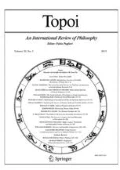Abstract
Section 1 discerns ambiguity in the word “truth”, observing that the term is used most naturally in reference to truth-bearers rather than truth-makers. Focusing on truths-as-truth-bearers, then, it would appear that alethic realism conflicts with metaphysical realism as naturalistically construed. Section 2 discerns ambiguity in the purporting of truth (as in assertion), conjecturing that all expressions, not just those found in traditionally recognized opaque contexts, can be read intensionally (as well, perhaps, as extensionally). For instance, we would not generally want to say that “The Matterhorn is 4,500 m high” expresses the same truth as “The Matterhorn is 14763.7795276 feet high” (or that it is true in the same range of utterance contexts), even though the two are extensionally equivalent. The reason is that they express different intensions.
Similar content being viewed by others
Notes
When I speak of extensional equivalences and apparent truth-conditions, I speak of the sorts of appearances that are widespread in the population of analytic philosophers. For an explanation as to why linguistic extensions and truth-conditions are not apparent to everyone, see Saka (2007).
It may be objected that “awake to” is implicitly an attitude predicate, so in line (2) “the morning star” does not appear in a genuine transparent context. For (2) to evoke or imply someone’s attitude, however, does not mean that (2) denotes or expresses any attitude; the literal semantics of “awake to” does not qualify it, under orthodox theory, as an opaque context. What’s more, other examples can be found that take us even further from attitude predicates (e.g. Jennifer Saul’s “Superman left the phone booth” versus “Clark Kent left the phone booth”).
“It is the mark of an educated man to look for precision,” says Aristotle, “just so far as the nature of the subject admits” (Nicomachean Ethics I.3).
Terminological diagnoses and stipulations are more than intellectual masturbation. If intensionalism is correct, and possibly even if it isn’t, language influences our perceived reality and helps to frame issues. In that case, it’s worth inquiring into the terminology we have and deliberating over reforms.
This paper benefitted from contributions by Amy Copland, Steven Crowell, Tim Huber, and Bert Koegler, and to them I am grateful.
References
Alston W (1996) A realist conception of truth. Cornell University Press, Ithaca
Armstrong DM (2004) Truth and truthmakers. Cambridge University Press, Cambridge
Bach K (1987) Thought and reference. Oxford University Press, Oxford
David M (2005) Armstrong on truthmaking. In: Beebee H, Dodd J (eds) Truthmakers. Oxford University Press, Oxford
Devitt M (1991) Realism and truth. Blackwell, Oxford
Dewey J, Bentley A (1948) Knowing and the known. Beacon Press, Boston
Elgin C (1997) Between the absolute and the arbitrary. Cornell University Press, Ithaca
Fumerton R (2002) Realism and the correspondence theory of truth. Rowman & Littlefield, New York
Gardner M (1983) The whys of a philosophical scrivener. William Morrow, New York
Gibbs R (1994) The poetics of mind. Cambridge University Press, Cambridge
Goldman A (1999) Knowledge in a social world. Oxford University Press, Oxford
Grandy R (1986) Some misconceptions about belief. In: Grandy R, Warner R (eds) Philosophical grounds of rationality. Oxford University Press, Oxford
Horwich P (1990) Truth. Blackwell, Oxford
James W (1890) The principles of psychology. Henry Holt, New York
Kirkham R (1992) Theories of truth. The MIT Press, Cambridge
Krifka M (2009) Approximate interpretations of number words. In: Hinrichs E & Nerbonne J (eds) Theory and evidence in semantics. CSLI, Stanford
Kunne W (2003) Conceptions of truth. Oxford University Press, Oxford
Lakoff G, Johnson M (1980) Metaphors we live by. University of Chicago Press, Chicago
Merricks T (2007) Truth and ontology. Oxford University Press, Oxford
Mikkola M (2008) Feminist perspectives on sex and gender. Stanford Encyclopedia Philos, Accessed 2 Feb 2009
Putnam H (1981) Reason, truth, and history. Cambridge University Press, Cambridge
Rorty R (1998) Truth and progress: philosophical papers, vol 3. Cambridge University Press, Cambridge
Saka P (2007) The argument from ignorance against truth-conditional semantics. American Philosophical Quarterly 44(2):157–170
Saka P (2008) How to think about meaning. Springer, Berlin
Saul J (1997) Substitution and simple sentences. Analysis 57:300–308
Schmitt F (1996) Truth: a primer. Westview, Boulder
Searle J (1979) Referential and attributive. In: Expression and meaning. Cambridge University Press, Cambridge
Searle J (1997) The construction of social reality. The Free Press, New York
Sommers F (1997) Putnam’s born-again realism. J Philos 94:453–471
Stich S (1986) Are belief predicates systematically ambiguous? In: Bogdan R (ed) Belief. Oxford University Press, Oxford
Tennant N (1997) The taming of the true. Oxford University Press, Oxford
Author information
Authors and Affiliations
Corresponding author
Additional information
“The truth,” says Oscar Wilde, “is rarely pure and never simple” (The Importance of Being Earnest).
Rights and permissions
About this article
Cite this article
Saka, P. Rarely Pure and Never Simple: Tensions in the Theory of Truth. Topoi 29, 125–135 (2010). https://doi.org/10.1007/s11245-009-9072-5
Published:
Issue Date:
DOI: https://doi.org/10.1007/s11245-009-9072-5


